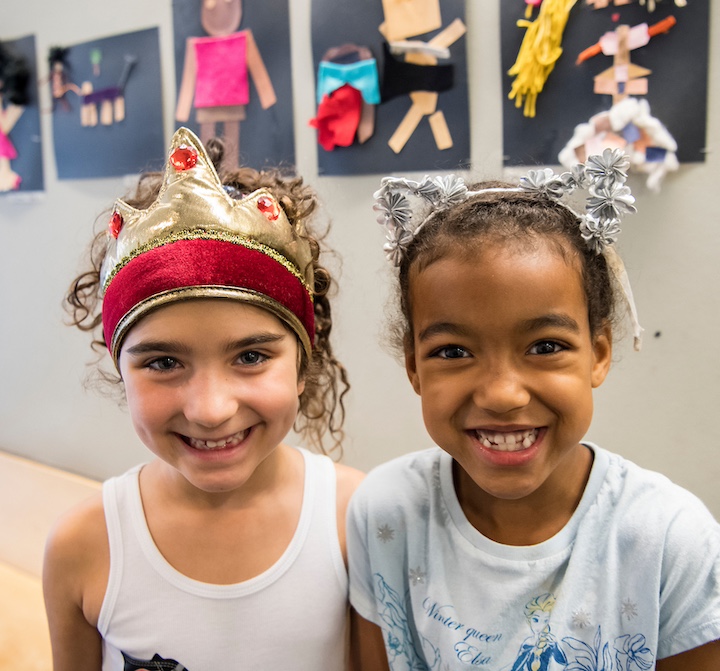Program & Academics
At Bank Street School for Children, students build the courage and confidence to think independently, work collaboratively, and understand themselves and others more deeply. By developing essential skills and knowledge in math, literacy, science, and other core subject areas, our students become deeply prepared to pursue lifelong goals, adapt to new challenges, and contribute meaningfully to their communities and the world.
Our approach is grounded in an understanding of what works best for children at each stage of their development. At every grade level, Bank Street students are immersed in joyful learning experiences and age-appropriate challenges relevant to their lives. Children pursue academic growth through a rigorous interdisciplinary curriculum, which allows them to make connections across various subject areas, refine their critical thinking skills, and apply their knowledge in real-world contexts. Our teachers know every child well and tailor their teaching to reach each learner by encouraging and facilitating student questioning, exploration, and discovery.
We believe that social-emotional development is at the core of effective teaching and learning. By creating a nurturing, supportive environment, we help students build emotional resilience and strong relationships that serve as the foundation for academic growth. Our approach integrates social-emotional learning into every aspect of the curriculum, ensuring that students not only master academic concepts and grow intellectually, but also develop empathy, emotional regulation, and problem-solving skills. With this strong foundation, they are empowered to engage more deeply in learning and ultimately achieve their fullest potential in school and beyond.
Learn more about our program below.
From their earliest years at Bank Street, children develop a love for reading through exposure to a range of books, work in reading groups, and phonics instruction. This strong foundation helps students enjoy reading and writing about fiction and nonfiction alike. By the time students reach eighth grade, their deep comprehension and analytical skills allow them to engage with diverse, challenging texts. Our literacy program is designed to empower students at every stage, cultivating a community of thoughtful, engaged readers and communicators.
Math
At Bank Street, math education is inquiry-based and begins in the early years with hands-on exploration of numbers and patterns. This foundation helps students develop critical problem-solving skills that they continue to use through the rest of their academic journey. By eighth grade, many of our students are doing high school algebra, preparing them to approach complex concepts in rigorous high school math programs.
Measuring Academic Growth
Our approach to measuring academic growth focuses on understanding each child’s unique development. Using a variety of assessment tools, observations, and benchmarks, we gain insights into each student’s progress and areas of growth, partnering with families in support of each child. Our team collaborates across grade levels to ensure seamless learning—tracking growth in core skills and competencies rather than relying on rote memorization. By focusing on key developmental milestones and lifelong learning strategies, we empower students to build a strong foundation for future academic success.
Explore the School for Children
-
Lower School (Preschool–Fourth Grade)

Lower School (Preschool–Fourth Grade)
Where lifelong learning begins.
Bank Street’s interconnected learning model starts in the Lower School with social studies at its core. Whether in the block area, on our enclosed play deck, at the art table, or solving problems with friends, teaching teams foster students’ social and emotional resilience, intellectual curiosity, and expanding knowledge of the world around them.
-
Upper School (Fifth–Eighth Grade)

Upper School (Fifth–Eighth Grade)
Preparing for high school and beyond.
In the Upper School, students acquire the skills to thrive in high school and beyond. Homerooms are team-taught by a math/science teacher and a humanities teacher, who encourage students to ask hard questions and think critically about the world and structures around them.
-
Diversity & Inclusion

Diversity & Inclusion
What potentialities in students do we want to develop?
This question inspired Bank Street founder Lucy Sprague Mitchell continues to drive the School for Children more than a century later. Our work is based on the faith that human beings can improve the society they have created.
-
After School

After School
Building community and fostering learning.
Children from different classrooms and age levels come together in extended-day programs that offer hands-on activities such as music, dance, cooking, drama, and outdoor play. There’s so much to do—from tap dance to chess, coding to Karate, woodworking to cooking, pottery to Super Science.
-
Summer Camp

Summer Camp
An enriching summer experience.
Bank Street Summer Camp is composed of fun and educational programs for children ages 4 through 16. Programs include Early Childhood, Spanish Immersion, Musical Theater, Sports, STEAM, and Travel. Each program includes the Red Cross’s Learn to Swim Program.
